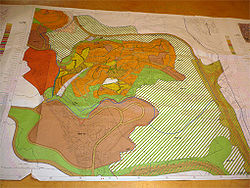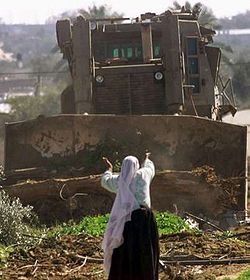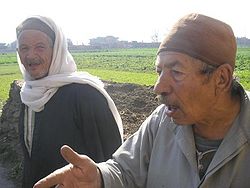Land Struggle
This section provides a record of historic and contemporary expressions of struggle to claim, attain, restore and/or retain land rights, as a function of the larger historic processes toward developing human rights norms and standards. Since current international law instruments ensuring established civil, cultural, economic, political and social rights—as well as emerging rights—reflect the outcomes of such foregoing struggles. Documents and testimonies gathered in this Landpedia section recognizes that such struggles form an indispensible contribution to our evolving human civilization and, thus, charts its further advancement.
The material discrimination institutionalized by Israel’s laws and institutions have roots in the Zionist movement and its organizations developed throughout the 20th Century. This study explains how these forced combine to pursue a system favoring Jewish (settler) labor on the land to the exclusion and dispossession of the indigenous Palestinian people. The authors explore the corresponding ideology and methods within the criteria constituting a system of apartheid.
In southern Tunisia’s Jemna Oasis, a region famous for producing its Deglet Nour (dates of light), an inspiring land struggle has taken place, offering a beacon of hope for other North African struggles. Over the past several years, the people of Jemna have regained their land rights from a long legacy of official corruption and land grabbing by political elites.
The Arab Spring uprisings have released a flood of land and property conflicts, brought about by decades of expropriations, corruption, poor performance of the rule of law, patronage and sectarian discrimination. Large components of national populations now seek to act on the consequent longstanding, acute grievances. Transitional or reforming governments and their international partners fail to address these grievances effectively, perpetuating stability. This article focuses on the land dynamic in Yemen, whose transitional government, with international support, had initiated a land and property mass claims process as part of the National Dialogue transition and makes recommendations to facilitate the process after the Houthi conflict comes to an end.
- BattirHIC-HLRN. Battir: Palestine Gains a New World Heritage Site (2014)](2014)
In a struggle for international recognition for their World Heritage Site, the Palestinian villagers of Battir succeeded in 2014. HLRN reports from the ground how that bid also promises to protect their lands for further dispossession and fragmentation by Israel’s annexation wall.
Modern Arab states have largely copied the land policies of former colonial powers, concentrating socio-economic development of cities, particularly the capital, and badly neglected the provinces. In both Egypt and Tunisia, a complete mismatch prevails between state agricultural policy and rural political consciousness, characterized by strong peasant populism and rural-development failures. Small farmers know what policies are needed to grow more food for the nation and improve their own standards of living, but they have been effectively barred from the development discourse and protection from the ravages of the market. It is against this historical trend that farmers struggle, despite the promises of recent uprisings.
With a perspective reflecting the diagnostic process of HLRN’s Land Forums since 2009, this article looks back on the repertoire of land struggles that have characterized important aspects of the uprisings and ongoing grievances over land grabbing in Bahrain, Egypt, Libya, Morocco, Tunisia and Yemen.
On the 64th Anniversary of the Nakba, The Badil Resource Center for Palestinian Residency and Refugee Rights has released the Spring-Summer issue of al-Majdal (issue #49) as a double feature. The first section examines the ongoing nature of the Nakba through Israel’s continued transfer of Palestinians on both sides of the “Green Line.” The second section includes visions for the struggle and ultimate implementation of Palestinian refugees’ right to return.
This article reflects the views of international solidarity with land struggles of people under occupation, as well as the mutual solidarity that has formed among them. The author begins from the Western Sahara and explores the commonalities with the struggles against occupation and alien domination shared by Tibetans, Kurds and Palestinians.
The dominant corporate food system has failed. The promises of the 1996 World Food Summit, echoed by the Millennium Development goal of reducing hunger by 2015, will not be fulfilled.
In some cases, evicted residents were resettled in new and remote locations, creating huge costs and obstacles for them in accessing work, services, education and maintaining their security. In other cases, people received modest compensations that were by no means adequate, given the tremendous costs and losses inflicted upon them and their children.Cows, Korans, and Kalashinkov: With continued massive human suffering and violence in Darfur, there is discussion about increasing U.S. and international military involvement in the Sudan. With that in mind, this article provides an overview of the 2002 cease-fire monitoring mission in the Nuba Mountains of central Sudan. Singular, bounded, and often inchoate causes—“It is a religious conflict”; “It is a competition for diminishing resources”—are often given as explanations for the conflict there and in Darfur. These explanations are not wrong in themselves, but they are inaccurate and misleading, if one examines them in isolation. The discord in the Nuba Mountains, for example, predates the actual fighting that began in the 1980s and has roots more complex than ethnic or racial difference between the Arab (primarily Islamic) North and African (mainly Christian) South. The current conflict is the most recent product of historical enmities and clashes that coalesce along socioeconomic lines.
Ahwazi Arabs are an indigenous, ethnic, national and a linguistic minority in Iran. Iran is composed of 6 major national and ethnic groups, Persians, Turks, Arabs, Kurds, Baluchis and Turkman. We should note that Mr. Yossef Azizi, Banitoruf, an Ahwazi Arab journalist, human rights and minority rights researcher who has done significant work in this area, has been arrested on 25 April, 2005 for criticizing government’s recent killing of Arabs in Khuzestan. Mr. Banitoruf remains in jail without charges, a clear violation of the United Nations protocols on the right to freedom of opinion and expression. For more information and analysis, click the link for the whole report.
*New Political Science, Marginalization and Resistance: The Plight of the Nuba People(2001)This paper describes partly the rise of the political consciousness of the Nuba people in Sudan. Throughout modern Sudanese political history the Nuba have been victimized first by the colonial powers and later by the northern Sudanese political elite. The present conflict in the Nuba Mountains is the refusal of the Nuba people to succumb to the different types of coercion staged by the Sudan government to ensure political hegemony. This inevitably gave breed to antagonisms against policies of domination. At the core of the dispute, therefore, are factors such as political marginalization, economic deprivation and socio-cultural indoctrination. Few examples are given to demonstrate how the northern political elite manipulates religion and Arabic culture in furtherance of northern Sudanese racial as well as political supremacy.
Unity Among Peasants, landless, Women Farmers and Rural Youth: La Via Campesina is the international movement which brings together millions of peasants, small and medium-size farmers, landless people, women farmers, indigenous people, migrants and agricultural workers from around the world. It defends small-scale sustainable agriculture as a way to promote social justice and dignity. It strongly opposes corporate driven agriculture and transnational companies that are destroying people and nature.
- Maroc : les femmes et les terres collectives, lutte pour la reconnaissance des droits fonciers « » ADFM & Forum des Alternatives Maroc 2009
- Burnat, Emad “Bil`in Marks Six Years of Struggle 18–02–2011" 2011
- Congrès Mondial Amazigh Maroc : Les exigences fondamentales des Amazighs »2011
- E-Torpedo [http://www.e-torpedo.net/article.php3?id_article=1293 La lutte des paysans pauvres d’Ouzioua au Maroc
pour le droit aux biens publics »] 2006
- Heard, Brenda Enduring Palestine Land Day“ 2011Taliwine Intifada
- lahoucine « » Taliwine Intifada 2006
- Michaelangelococco Land day 2008, Jaffa (II) 2008
- Michaelangelococco Land day 2008, Jaffa (III) 2008
- Palestinian Grassroots Anti-Apartheid Wall Campaign Palestinian Grassroots Anti-Apartheid Wall Campaign Bil`in: Popular Struggle
- Popular Struggle Coordination Committee Bil'in Popular Struggle 2011
- Rihan, M. and M. Nasr “Prospects for Land Reform and Civil Society Movements in the Near East and North Africa” 2001
- yisraelpnm “Land Day in Jaffa 2-4-11” http://www.youtube.com/watch?v=m5uMX_n_Ev4&feature=related 2011
- حركة الأرض والكرامة التهاميون يناضلون كالفلسطيين ضد الاحتلال الداخلي الذي سيطر على سلة الغذاء وحتى لاتتحول تهامة اليمن الى سند تملك عقاري لنظا التهاميون يناضلون كالفلسطيين ضد الاحتلال الداخلي الذي سيطر على سلة الغذاء وحتى لاتتحول تهامة اليمن الى سند تملك عقاري لنظا 2011


